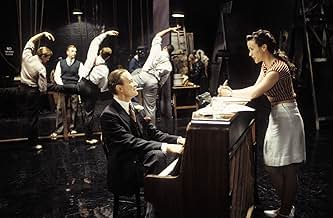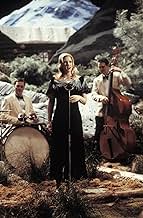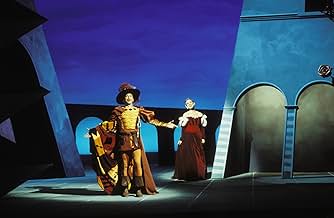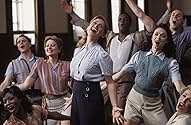As vidas de Cole e Linda Porter nunca foram nada menos do que glamorosas. Embora a sede pela vida de Cole tenha desgastado seu casamento, Linda nunca deixou de ser sua musa, inspirando algum... Ler tudoAs vidas de Cole e Linda Porter nunca foram nada menos do que glamorosas. Embora a sede pela vida de Cole tenha desgastado seu casamento, Linda nunca deixou de ser sua musa, inspirando algumas das maiores músicas do século XX.As vidas de Cole e Linda Porter nunca foram nada menos do que glamorosas. Embora a sede pela vida de Cole tenha desgastado seu casamento, Linda nunca deixou de ser sua musa, inspirando algumas das maiores músicas do século XX.
- Direção
- Roteirista
- Artistas
- Prêmios
- 2 vitórias e 13 indicações no total
Avaliações em destaque
Those people in the audience who had no idea about Mr. Porter's sexual preference, oh'd and ah'd in the beginning. Then they learned that all the talent in the world, all the money in the world, all the joyous hedonism of youth in the world - all of it falls in upon itself as age overcomes and destroys the arrogance of youth.
Irwin Winkler has given us an unflinching portrait of an unusually talented man, an unusual life, and a painful end to that life.
My palms were ice cold and I felt drained as this film concluded - not because it failed as a project, but because it succeeded so well.
DE-LOVELY is not an easy movie but it is a brilliant one.
I can't understand why with the talented people involved with this film the end result is so cinematic ally clichéd and dull. The screenplay's structure simply misses. First of all, there's somewhat of a contradiction in Cole Porter's lyrics and the life he lead. His songs are clever, intricate entertainment. His life was a whole 'nother story put together and thus to imply that every one of his songs were inherently autobiographic and profound windows into his psyche is a misuse of the music. That's why the songs as employed here are all a dissonant fusion of Porter's delicate, lyrical greatness and the rough, mediocrity of such contemporary voices as Alanis Morrissette and Sheryl Crow. The songs aren't allowed to beam in their true nature and are forced to carry all this mysterious exposition- most of which is historically inaccurate. One example is how the movie uses the song 'True Love' to depict the seeming duality Porter had in his feelings towards Linda and his 'other life', shall we say. In actuality the song wasn't written until around 1957 when Porter, in conference with Saul Chaplin, the Associate Musical Director for the film 'High Society', was asked to create a song that sounded 'old fashioned'.
I wish somebody would explain to me why Hollywood bothers to make these 'biopics' if they aren't really interested in the subjects. What's amazing about 'Delovely' is how Jay Cocks's screenplay manages to make Porter's life less interesting or dramatic. I imagine Porter's life was filled with so many swellagant, jet set parties and countless interesting anecdotes. I was just reading one in the New York Sun involving Cole, Truman Capote and an airline steward. Porter's homosexual liaisons had to be a trifle more exciting then presented here otherwise he needn't have bothered. I know this film's PG but come on- Hitchcock's 'Rope' was sexier than this. Regardless, what we get for the most part is a fastidious Kline at the piano in a small room full of guests sipping tea like they're all living in Arthur Sullivan's era.
I'm still bewildered at how a movie about the life of Cole Porter was actually made in today's culture. I'm reminded now of the great CD from the early nineties, 'Red Hot + Blue: A Tribute that featured a whole mess of contemporary rock stars performing Porter's songs. What is it about Cole Porter that the entertainment industry deems so commercial or universal? Especially nowadays when movies are becoming less and less about the art or the idea and are unctuously fixated on perspective profits only. Most new releases in the past few years are that of tired action formulas and boring special effects extravaganzas involving comic book characters and trolls and hobbits and whatnot. That's why 'Delovely' was such a welcoming notion and I'm moved towards commending the film as, at the very least, a sincere attempt at raising the bar a little. Yet in the end, is it the good turtle soup or merely the mock?
Serving as a framework for the life events is a curious narration of sorts by an aged Porter and a mysterious host/angel (a nice theatrical turn by Jonathan Pryce). This bracketing narration is reminiscent of A Christmas Carol, and there are striking similarities to the classic All That Jazz in narrative and tone. The main story is told in a series of mini-vignettes; some scenes are almost too brief. Then there are the songs. It is truly phenomenal just how many wonderful Porter songs became standards. The recreations of many of his top hits are interspersed throughout the film and are performed often by top vocalists including some amusing cameos by Elvis Costello, Diana Krall, Alanis Morissette, and Natalie Cole. The songs serve to parallel and punctuate the life events throughout the story in much the same way paintings served as a co-narrative in Frieda.
Although production values are good for a period and location piece, it feels a little less grand in scope than it ought to be. Perhaps that works in the films favor as a more intimate story. Standout credit goes to the makeup effects especially showing the aging of Kevin Kline's character. The camera work and editing are imaginative especially in a series of circular tracking shots which seamlessly meld one timeframe with another. The music is timeless and enjoyable even when sung in pedestrian fashion by Kline. And regarding Kline, he deserves an Oscar nomination for a richly etched portrait of a tortured soul whose search for true love spanned his entire life. Perhaps in the hands of Bob Fosse or Baz Luhrmann, this could have really launched into a wildly imaginative send-off of a musical genius, but director Irwin Winkler (a respected producer turned director like Alan Pakula) has done Cole Porter proud.
From the opening scene in the theatre, it just got better as it went along. Kevin Kline's portrayal of Cole Porter was rich and nuanced. He seemed to be truly in love with Linda, yet he still had his other side. Ashley Judd as Linda seemed perfect. When the old Cole Porter sees her again, he says, "My god, she was lovely!" and she was. I identified enough with her and with Kevin Kline that I was saddened by her death in the movie. They sold me on their characters. I ended up feeling empathy for Linda; the lovely, lovable and steadfast; and respect and admiration for the Cole Porter figure.
But, what made the movie fly for me was the music (go figure!). It was Cole Porter, release 1.1. A bunch of his great songs were re-arranged and presented by modern singers - all the way from jazz (Diane Krall) to varieties of pop (Elvis Costello). Each of the singers brought a new feel to the Cole Porter songs and really made the movie a pleasure.
When my wife and I finished the movie on the DVD we spent another hour watching all the special features. We both hated to see the movie end. We just wanted it to go on and on. Like the beat, beat, beat of the tom-tom.........
Você sabia?
- CuriosidadesMany scenes in the film are actually one continuous shot. The scene where Cole is visiting the gentleman's club during the song "Love For Sale" is a good example. The scene is supposed to be representing three different times where Cole was in the club. Most of the dancers are costume personnel who would perform costume changes on other actors and themselves and then walk back into the shot. Even the singer changes hair pieces and earrings in this shot.
- Erros de gravaçãoThe scene depicting the song "So In Love" on the opening night of "Kiss Me, Kate" depicts the song as a duet between the two leads during the show's Shakespearean play-within-a-play. In "Kiss Me, Kate," "So In Love" is not a duet. Both of the leads do sing solo versions of the song at a different point in the show, however neither takes place in the play-within-a-play.
- Citações
Monty Woolley: Cole, he's only an actor but he still may be right. He's tried it 7 times already, the song's a problem.
Cole Porter: The song is not a problem, it's a challenge. Jack! Jack my boy, how can I help you? Ask me anything.
Jack: Write another song.
Cole Porter: Oh God, that cuts me right to the quick. I know it's God awful but it's the best I can do and we open in three days.
Jack: Where do you get your ideas?
Cole Porter: I get them all from a little Chinese man in Poughkeepsie.
Jack: Mr Porter, the song goes so high and so low it's impossible.
Cole Porter: It's not impossible. I wrote this with you in mind, I can sing it and I have a range of three notes.
- Cenas durante ou pós-créditosThe music credits, along with their prime singers, are shown twice, once just before the cast, and then further down where the music credits usually are.
- Trilhas sonorasIn the Still of the Night
Performed by Kevin Kline and Ashley Judd
Written by Cole Porter
Published by Warner Bros., Inc. / Chappell & Co, Inc. (ASCAP)
Produced by Stephen Endelman and Peter Asher
Principais escolhas
- How long is De-Lovely?Fornecido pela Alexa
Detalhes
- Data de lançamento
- Países de origem
- Central de atendimento oficial
- Idiomas
- Também conhecido como
- De-Lovely
- Locações de filme
- Empresas de produção
- Consulte mais créditos da empresa na IMDbPro
Bilheteria
- Orçamento
- US$ 15.000.000 (estimativa)
- Faturamento bruto nos EUA e Canadá
- US$ 13.456.633
- Fim de semana de estreia nos EUA e Canadá
- US$ 292.963
- 4 de jul. de 2004
- Faturamento bruto mundial
- US$ 18.611.951
- Tempo de duração2 horas 5 minutos
- Cor
- Mixagem de som
- Proporção
- 2.35 : 1
Contribua para esta página




































